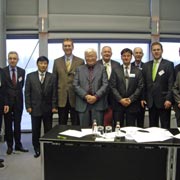
|
contents | asia | ||||
| Agritechnica organiser and Mongolia sign cooperation deal  DLG (German Agricultural Society), the organizer of Agritechnica, the world's largest agriculture machinery show, signed a memorandum of understanding (MOU) with Mongolia 's ministry of agriculture, with the aim of providing technical assistance and support to develop the Mongolian agriculture sector. This MOU marked the finalisation of talks between Mongolian and German agri-technology specialists, which began in Ulaanbataar in March this year. Much of Mongolia 's arable land is still under-utilized and climatic extremities, particularly unseasonable frosts, can bring damage to as much as 10 to 30 percent of the harvest crop. In 2008, agriculture provided about 36 percent of employment and almost 19 percent of GDP. Livestock herding is the main activity while main crops grown are wheat, barley, pulses and potatoes. In this cooperation, German technology and farming methods will be introduced and implemented in Mongolia . DLG (German Agricultural Society), the organizer of Agritechnica, the world's largest agriculture machinery show, signed a memorandum of understanding (MOU) with Mongolia 's ministry of agriculture, with the aim of providing technical assistance and support to develop the Mongolian agriculture sector. This MOU marked the finalisation of talks between Mongolian and German agri-technology specialists, which began in Ulaanbataar in March this year. Much of Mongolia 's arable land is still under-utilized and climatic extremities, particularly unseasonable frosts, can bring damage to as much as 10 to 30 percent of the harvest crop. In 2008, agriculture provided about 36 percent of employment and almost 19 percent of GDP. Livestock herding is the main activity while main crops grown are wheat, barley, pulses and potatoes. In this cooperation, German technology and farming methods will be introduced and implemented in Mongolia .The agreement involves the DLG and companies in the AMMAC group which are involved in the export of machinery, implements and consumables as well as in development projects in Eastern Europe, Central Asia and Africa . Companies in the group include CLAAS Global Sales, Lemken, GEA Farm Technologies, WM Kartoffeltechnik and Beinlich Irrigation. As part of the collaboration, companies would share their experiences and transfer expertise to further develop and train well-skilled and qualified agricultural personnel in Mongolia. The introduction of new technologies and their applications will further improve crop yields and strengthen the process of agricultural mechanization. In addition, service infrastructure such as leasing facilities, technical service centres, and financing arrangements will also be coordinated and established. Livestock raising, mainly through semi-nomadic pastoral grazing, constitutes 80 percent of Mongolia 's agricultural production. More than 80 percent of Mongolia 's land area is used for livestock herding. Yet the inadequate usage of breed genetics has resulted in lower levels of productivity. To help raise the quality of Mongolian livestock herds, German genetic experts will provide their expertise in breeding, with further training of Mongolian agricultural professionals to take place in Germany. Specific measures will be implemented to enhance the project's objectives. These include company analyses, strategic planning, consulting services to agribusinesses to raise the level of competitiveness, and educational programmes for agribusiness managers and workers. The cooperation was initiated by AMMAC in March this year in Ulaanbaatar, during the 1st International Mongolian-German Agricultural Mechanisation Symposium, an event supported by the DLG. write your comments about the article :: © 2009 Exhibition News :: home page |